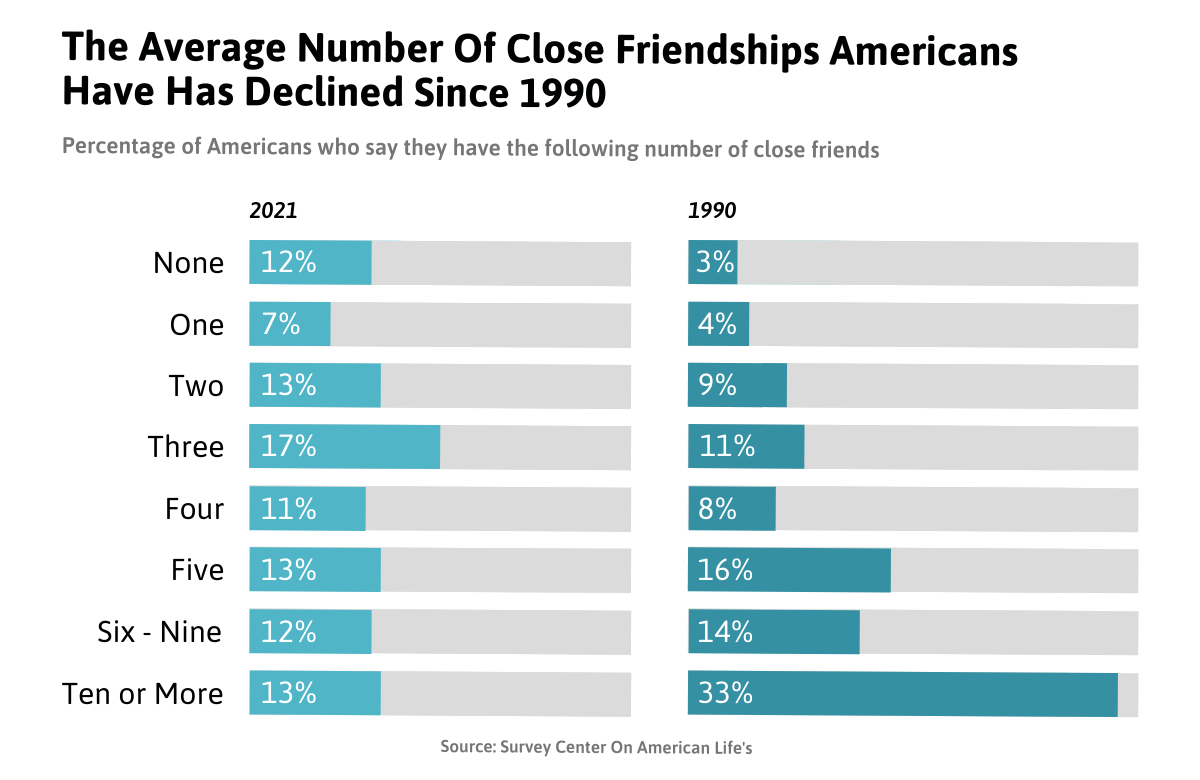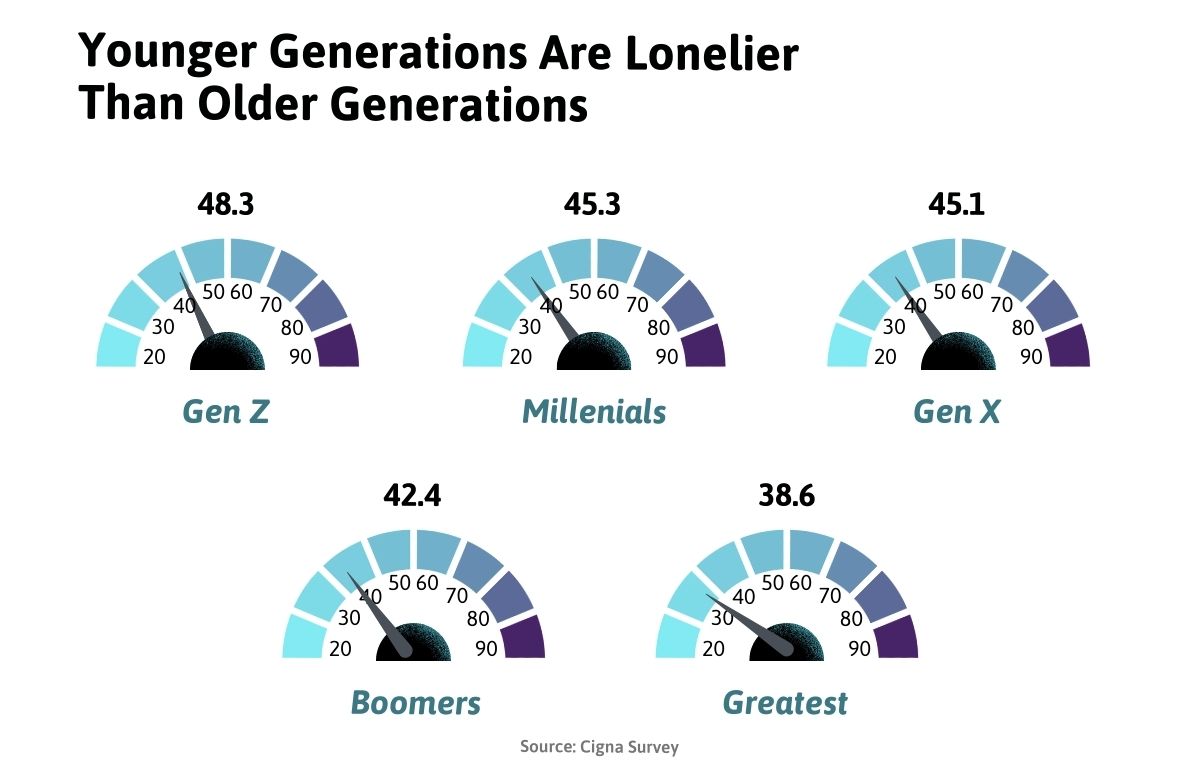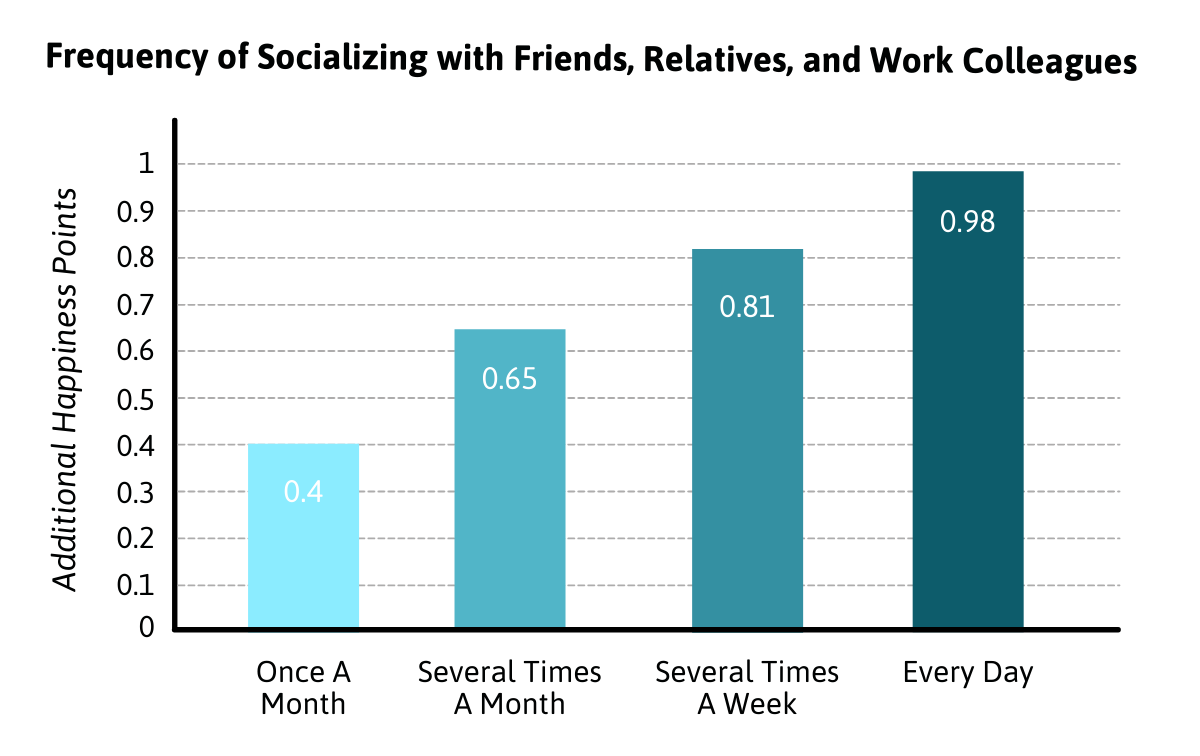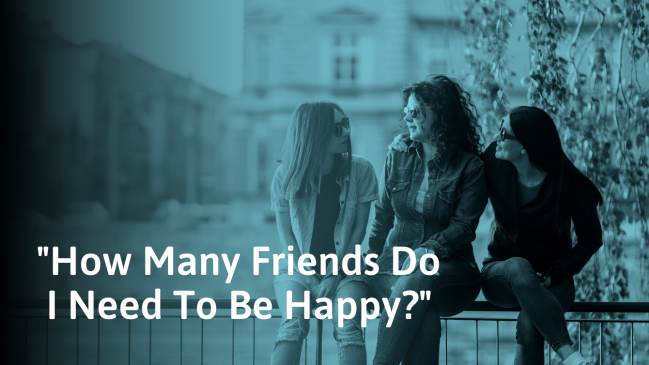“I only have two good friends. I’m not sure if this is normal. How many friends do you need?”
Are you feeling insecure about the number of friends you have? Whatever the size of our social circle, most of us wonder how we compare to other people and whether or not we are “normal.”
Social media can make us particularly self-conscious about our social life. People we know may have hundreds or even thousands of online friends and followers. Scrolling through our social media feed, we see pictures of old classmates at parties, on vacations, and with a variety of other people. Posts they make may get large numbers of comments full of compliments, emojis, and inside jokes.
In this article, we’ll go over some statistics regarding how many friends people report having. We’ll also go over studies that look into whether having more friends truly makes you happier.
Sections
- How many friends do you need to be happy and fulfilled?
- How many friends does the average person have?
- How many friends does a popular person have?
- How many friends can you have?
- How many close friends should you have?
- Is it OK not to have lots of friends?
How many friends do you need to be happy and fulfilled?
People with 3-5 friends report greater life satisfaction than those with a smaller or larger number.[9] Moreover, if you have someone who considers you their “best friend,” you’ll probably feel more satisfied with your life than people who don’t.[9]
Imagine human beings as similar to plants. While almost all plants need a good combination of sunshine, water, and nutrients, the amount and balance between these things change. Some plants thrive in dry and sunny areas, while others wither without daily water. Some do better in the shade, while others need more direct sunlight.
The way we meet these needs may vary from person to person. Socially, some people are more introverted and prefer meeting people one-on-one, while others enjoy group settings. Some people are content to meet with their partner and family on a regular basis, while others enjoy having a larger circle they can rotate. And while some need lots of alone time, preferring to live alone and spend several evenings a week doing solitary activities, others desire more social connections.
Here is a guide on how to be happier in life according to science.
How many friends does the average person have?
In a 2021 study by the American Survey Center, 40% of Americans reported having fewer than three close friends.[1] 36% reported that they have between three and nine close friends.
Compared to past surveys, the number of close friends Americans have seems to be declining. While in 1990 only 3% of those surveyed said they have no close friends, the number rose to 12% in 2021. In 1990, 33% of respondents had ten or more close friends, and in 2021 that number has dropped to just 13%.

This trend seems to have started before the 2020 COVID pandemic. A 2018 Cigna survey of 20,000 Americans found a significantly higher incidence of loneliness in younger generations, with those between the ages 18-22 being the loneliest group.[2]

According to a Cigna survey (2018), Gen Z is lonelier than any other generation
It’s important to note that the Cigna study focused more on feelings of loneliness rather than the number of friends one has. It found that regardless of the number of friends one has, almost half of Americans said they sometimes or always felt alone or left out. 43% said that their relationships didn’t feel meaningful.
Does having more friends actually make you happier?
One study that used data from a Canadian survey of 5000 participants and European surveys from 2002–2008 found that a higher number of real-life friends, but not online friends, has a significant impact on personal happiness and subjective well-being.[3]
The study found that doubling the number of real-life friends has affected their happiness levels to the same degree as a 50% paycheck increase. The effect was smaller on those who were married or living with a partner, likely because their partner fills many of their social needs.
Just having people to call friends wasn’t enough. The frequency in which one meets their friends has a significant impact on well-being, too. With every increase (from less than once a month to once a month, several times a month, several times a week, and every day), there was an additional increase in subjective well-being.

It’s important to remember that while statistics give us valuable information, it doesn’t necessarily tell us what is best for us. You don’t need to go out and make more friends just because the “average person” has more friends than you. However, it may be worth considering whether increasing the time spent with friends may positively influence your life. And as the Cigna survey showed, it may be more beneficial to have fewer friends that know you better.
How many friends does a popular person have?
People who are considered popular tend to have a lot of friends, or at least seem like they do. They’re invited to events and seem to earn the envy of many. But if we take a closer look, we may find that they have more casual friends rather than close friends (for more, read our article on the different types of friends).
One study on American middle-schoolers found that both popularity and lack of popularity were associated with low social satisfaction and poorer “best friendship” quality.[4] This means that while popular people may have many acquaintances and casual friends, they may still be lacking in close and meaningful friendships.
Of course, adults and middle-schoolers are quite different, but studies on popularity in adults are harder to find (and popularity in adults is harder to measure and observe). Still, these results on children are useful because they show us that perceived popularity isn’t necessarily tied to happiness or social satisfaction.
How many friends can you have?
Now that we’ve looked at some statistics on how many friends the average person has, let’s consider another question: How many friends is it possible to have? Is it always “The more the merrier”? Is there a limit to the number of friends we can keep up with?
An anthropologist named Robin Dunbar proposed the “social brain hypothesis:” due to the size of our brains, humans are “wired” to be in groups of around 150 people.[5] Studying groups of hunter-gatherer societies supported this hypothesis, which posits that humans struggle to keep up with more than 150 people. Some neuroimaging studies support this claim and show that in humans and other primates, the large brain-to-body ratio corresponds to the size of the social group.[6]
Even if Dunbar’s Number theory isn’t completely accurate, it makes sense that there is a limit to the number of friends we can have.
Most of us need to balance time spent with friends with other responsibilities, such as work, school, and keeping up with our home. We may have kids to take care of, family members that need our support, or perhaps physical or mental health issues that we need to spend time managing.
Since we only have 24 hours in a day (and we all need to eat and sleep), it can feel difficult enough to see 3-4 friends regularly. Making new friends takes time, too. According to Dunbar’s new book, Friends: Understanding the Power of Our Most Important Relationships, it takes 200 hours to turn a stranger into a good friend.
How many online friends can you have?
While the internet can help us meet new people and keep in touch with friends even when we’re unable to meet in person, there’s a limit to our mental capacity, too. Being a good friend requires reserving some “mental space” to keep track of what goes on in our friends’ lives. If we don’t, our friend may be hurt that we keep forgetting the name of their partner, the hobby they’ve been practicing for the past year, or what they do for work.
In that sense, it makes sense that the limit for the number of friends we can realistically have is much lower than 150, even if we have lots of free time.
How many close friends should you have?
With all that said, how many friends should you have?
As mentioned, this is an individual question that depends on many factors, such as how much free time you have, whether you prefer social or solo activities, and how satisfied you are with your current number of friends.
However, you may like to try this approach:
- Aim for one to five close friends, meaning friends you feel you can talk to when something is bothering you, who can provide acceptance and emotional support. Because it takes time and effort to build such a close friendship, it may be difficult to have more than five such friends.
- A larger group of friends you can go out with or casually talk to. Having 2-15 friends you can talk to occasionally, who know a bit about you, can increase your social activity and, in turn, your well-being. You may have a “friend group” that does things together, or several friends from different groups, or both.
- The third and largest social circle is your acquaintances. These can be coworkers, friends of friends, or people you run into regularly but don’t know too well. When you run into them, you say “Hi” and possibly strike up a conversation, but you wouldn’t feel comfortable texting them when you had a bad date. Most of us have more acquaintances than we can think of. Sometimes these connections turn into closer friendships, but often they just remain a network of people we may respond to when they post a “for friends of friends” job offer or roommate position.
We struggle with loneliness when we only have acquaintances but don’t have closer friends. If you feel stuck at the “acquaintance” or “casual friend” level, read our tips on how to get closer to your friends.
Is it OK not to have lots of friends?
As you can see, many people feel lonely, whether it’s because they have no friends or because their friendships lack depth.
It’s also normal to have a different number of friends in various phases of your life.[7] You may have more friends when you’re in high school, college, when you’re a newlywed, or when you’re closer to retirement age. Factors like moving cities, changing jobs, or going through difficult times can also influence the number of friends you have at any given time.
It’s common to look at the number of friends our friends have to question whether the amount of friends we have is normal (and it always seems like our friends have more friends than we do, due to mathematical factors).[8]
Social media, in particular, can make it seem like everyone is living a better life than we are.
Remember, on social media, we see the highlight reels of several people at once. Social media doesn’t show the whole story, so try to refrain from comparing yourself. You may even want to unfollow some accounts if you notice you feel particularly bad after viewing them.
The bottom line
It’s OK not to have a lot of friends. The important thing is to ask yourself what would feel right for you. Is fear keeping you from making new friends, or are you content with what you have? Some people are happy with few close friends. And if you decide you want to make more friends, that’s something you can work on when you’re ready.








